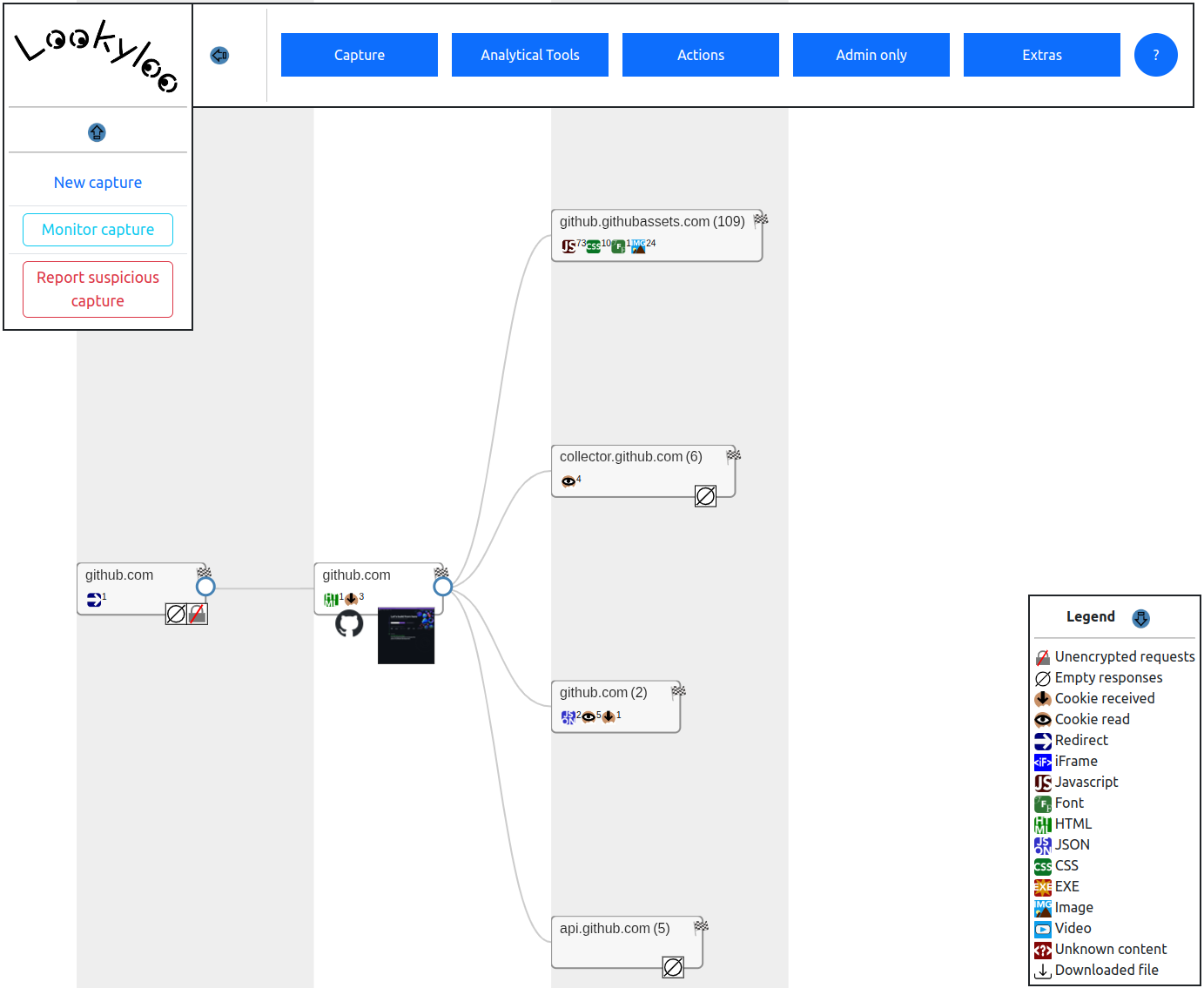mirror of https://github.com/CIRCL/lookyloo
85 lines
3.4 KiB
Markdown
85 lines
3.4 KiB
Markdown
[](https://www.lookyloo.eu/docs/main/index.html)
|
|
|
|
*[Lookyloo](https://lookyloo.circl.lu/)* is a web interface that captures a webpage and then displays a tree of the domains, that call each other.
|
|
|
|
|
|
[](https://gitter.im/Lookyloo/community?utm_source=badge&utm_medium=badge&utm_campaign=pr-badge)
|
|
|
|
|
|
* [What is Lookyloo?](#whats-in-a-name)
|
|
* [Install Lookyloo](#installation)
|
|
* [Lookyloo Client](#python-client)
|
|
* [Contributing to Lookyloo](#contributing-to-lookyloo)
|
|
* [Code of Conduct](###code-of-conduct)
|
|
* [Support](#support)
|
|
* [Security](###security)
|
|
* [Credits](###credits)
|
|
* [License](###license)
|
|
|
|
|
|
|
|
## What's in a name?!
|
|
|
|
```
|
|
Lookyloo ...
|
|
|
|
Same as Looky Lou; often spelled as Looky-loo (hyphen) or lookylou
|
|
|
|
1. A person who just comes to look.
|
|
2. A person who goes out of the way to look at people or something, often causing crowds and disruption.
|
|
3. A person who enjoys watching other people's misfortune. Oftentimes car onlookers that stare at a car accidents.
|
|
|
|
In L.A., usually the lookyloos cause more accidents by not paying full attention to what is ahead of them.
|
|
```
|
|
Source: [Urban Dictionary](https://www.urbandictionary.com/define.php?term=lookyloo)
|
|
|
|
|
|
## No, really, what is Lookyloo?
|
|
|
|
Lookyloo is a web interface that allows you to capture and map the journey of a website page.
|
|
|
|
Find all you need to know about Lookyloo on our [documentation website](https://www.lookyloo.eu/docs/main/index.html).
|
|
|
|
Here's an example of a Lookyloo capture of the site **github.com**
|
|

|
|
|
|
|
|
# Installation
|
|
|
|
Please refer to the [install guide](https://www.lookyloo.eu/docs/main/install-lookyloo.html).
|
|
|
|
|
|
# Python client
|
|
|
|
`pylookyloo` is the recommended client to interact with a Lookyloo instance.
|
|
|
|
It is avaliable on PyPi, so you can install it using the following command:
|
|
|
|
```bash
|
|
pip install pylookyloo
|
|
```
|
|
|
|
For more details on `pylookyloo`, read the overview [docs](https://www.lookyloo.eu/docs/main/pylookyloo-overview.html), the [documentation](https://pylookyloo.readthedocs.io/en/latest/) of the module itself, or the code in this [GitHub repository](https://github.com/Lookyloo/PyLookyloo).
|
|
|
|
# Contributing to Lookyloo
|
|
To learn more about contributing to Lookyloo, see our [contributor guide](https://www.lookyloo.eu/docs/main/contributing.html).
|
|
|
|
### Code of Conduct
|
|
At Lookyloo, we pledge to act and interact in ways that contribute to an open, welcoming, diverse, inclusive, and healthy community. You can access our Code of Conduct [here](https://github.com/Lookyloo/lookyloo/blob/main/code_of_conduct.md) or on the [Lookyloo docs site](https://www.lookyloo.eu/docs/main/code-conduct.html).
|
|
|
|
|
|
# Support
|
|
* To engage with the Lookyloo community contact us on [Gitter](https://gitter.im/lookyloo-app/community).
|
|
* Let us know how we can improve Lookyloo by opening an [issue](https://github.com/Lookyloo/lookyloo/issues/new/choose).
|
|
* Follow us on [Twitter](https://twitter.com/lookyloo_app).
|
|
|
|
### Security
|
|
To report vulnerabilities, see our [Security Policy](lookyloo/SECURITY.md).
|
|
|
|
### Credits
|
|
Thank you very much [Tech Blog @ willshouse.com](https://techblog.willshouse.com/2012/01/03/most-common-user-agents/) for the up-to-date list of UserAgents.
|
|
|
|
### License
|
|
See our [LICENSE](lookyloo/LICENSE).
|
|
|